|
The
difference between finding nobility or foolishness in people who
push themselves into situations precarious beyond what they have
been prepared to handle is all in how they respond to what they
eventually find in their way.
As Matthew Magennis' screenplay
Standard begins, his character Nathan is about to test the
waters of the unknown, to leave the stability of a relationship he
has with a pleasant girl named Olive. To do what? He doesn't know,
beyond just be in the moment, which at least for a time won't
include her.
Nathan's dissatisfaction with
his reasonable, staid, normal life is the impetus for his rash act.
Nathan needs to find himself and so he puts himself into his own
drama, relying on his instincts to guide him through. His problem,
we discover almost immediately, is that the development level of his
instincts are nascent at best.
"Do What You
Want to Do, Not What You Are Good At":
This is the sub-title to Magennis' screenplay and at
first it seems revealingly facile, like the impetuous pout of a
young adult protesting the unpleasant probabilities of a normal
life. Whether it is the sentiment of the screenwriter Magennis or
his character Nathan - and the distinction is not easily made - the
banality of the statement expertly frames the "character study nature"
of the work. Whatever profundity it contains becomes revealed as we
gain empathy for the bumbling Nathan and meet another face plate for Magennis in the character of Nathan's new-found friend Harriet, who
represents his focused self and Nathan's muse.
Magennis cites Harold and Maude
as an influence on his film, though his reasons are, one learns,
skewed from what most might assume. "The simple, long takes are
appealing to me, minimal and poetic," he says of the 1969 Bud Cort-Ruth
Gordon cult classic. As for quirky character development, the
parallels between the two screenplays are with people who feel
disconnected from those around them and the degrees to which they do
or don't wish to fit in. Magennis has a characteristically
unordinary take on that, presenting in Nathan a character who drops
out of his normal life to seek a more satisfying way, while Magennis
himself claims to have an abiding need to find joy in mundane
things.
So why on earth is he a filmmaker?
This filmmaking aspect of his life -
he also has a background in elementary school education - has its
roots in his hometown of Hollis, New Hampshire, a small town on the
outskirts of Nashua, a suburb of Boston, Massachusetts. As a high
school kid in Hollis, Magennis worked at a video rental store and
there, rather like famed filmmaker Quentin Tarantino before him, he
began his education in movies. "I started avoiding my friends and
taking home four movies to watch on my day off. Comedy, drama,
foreign films." He recalls that the film A Trip to Bountiful,
written by Horton Foote for television in 1953 and made into a
feature film in 1985, had a particular influence on him. This quiet,
sensitive story is a far cry from the grindhouse fare that piqued
the imagination of Quentin Tarantino, but Magennis style isn't
mayhem. In fact, it's comedy.
"It wasn't until a handful of years
later - you know, growing up in New Hampshire - that I even realized
that you could actually go and study film and filmmaking. I ran into
a friend of my girlfriend at the time who was going to Emerson, and
she was talking about how much she loved studying film. It never
even occurred to me until I was in my late teens. It never seemed
real or applicable to me."
The son of a 4th grade teacher/mother
and a computer tech father, Magennis grew up in relative affluence
that could have led to a peaceful, middle class life. He claims
never to have had stars in his eyes, but was moved to filmmaking
because "Every time I try taking the easy route I become
miserable..."
Though bitten by the film bug, only
one college in New Hampshire offered any kind of a film program
major, and Magennis couldn't afford the tuition, which he recalls
was around $36,000 per year. He instead went to Hunter College in
Manhattan, because "New York was the only viable place, in my mind,
to go." There he studied screen writing, but with minimal impact. He
recalls studying under a teacher with whom he was impressed because
a story he had written about a mouse had been animated into a
Christmas story. The regard was apparently not mutual. "Everyone
else got called upon to read their scripts but me... I am assuming
the teacher didn't think my writing was 'academic.' "
Perhaps as a result, Magennis doesn't
"consider myself a screenwriter. Screenwriters take it very
seriously and they want to write as much as possible, and hopefully
sell their screenplay to someone else and make money off of it. I
definitely don't see myself as that. I am a wannabe film maker who
can barely afford to do that kind of stuff, and if I want to make a
movie then I need to write a script. That's about as serious as I
can be about being a screenwriter."
This isn't to say that Magennis isn't
a capable writer. Besides the scripts he has generated, he has published short stories and poetry in
Berkeley literary publications.
CONTROL:
An admitted "control freak," Magennis marshals creative control of
the filmmaking process as best he can through writing, acting, and
casting his projects, which is quite a different approach from what
most people would characterize as a director's medium.
"Substance, for me, comes from the
writing. The other aspect of equal importance is the casting. How
good are the actors and how applicable are they to the screenplay."
One cannot over emphasize the extent
to which Magennis incorporates this holy triumvirate of crafts. He
is an independent filmmaker who crafts roles for unknown actors on
the periphery of the movie industry. His commitment to his actors as
integral to his vision for the film is exemplified by a scene in the
Standard screenplay that was cut because the actor chosen for the
one word scene became unavailable. Rather than recast what most
people would consider a part of minor significance, Magennis axed
the whole scene.
Casting comes first with Magennis.
"My philosophy is that story and actors are the most important
part."
Locations also play an important part
in Magennis' creative process, with scenes written to describe the
settings within which they are shot. It is another aspect of
Magennis' wholistic approach to project development. The footage for
Standard features prime Bay Area backroads locations,
including Bodie State Park, Inglenook, Post Costa, Rodeo, Oakland,
and Livermore locations. Says Magennis - "If Hollywood were based up in the Bay Area then all of
the locations I used would have been shot seven or eight times
already. A lot of this area remains uncharted, in many ways. I am
fascinated with location. It is a character in and of itself. There
are places in the state I can feel miserable and depressed because
of the architecture, and others that charm me no end. That's where a
story starts for me. Some people write from concept or character. I
start with location."
Magennis learned from filming his
previous screenplay, modest (sic), that pulling together a
crew for an independent film is all about first landing the Director
of Photography - the "DP." Magennis located DP and film editor
John Tulin (Mind's Eye, Sunday Girl), for whom he
held the start of production for months while Tulin finished film
work on another picture in England. Tulin is a guy one can build a
crew around and he comes with his own high definition digital camera
equipment, which for Magennis meant a savings of at least $250 per
day in equipment rental costs. With Tulin on board, the crew quickly
added Director ___________, sound man Blair Collins,
and associated gaffers and technical crew.
Standard was filmed over two weeks
last fall. "I have all the footage in the can," Magennis says. He
wrote his script using "Final Draft," which has become a script
formatting software standard to the film industry. He intends to
edit the raw footage himself, using "Final Cut Pro" on a Mac G5, but
he is taking time to view the footage repeatedly, making notes on
alternate edit possibilities before he gets started.
"I just want to stabilize myself
financially so I haven't even jumped into editing yet... Sometimes
we can benefit from taking a break and coming back with a fresh
perspective... It's going to be a long process because I'm obsessive
compulsive. I want everything to be perfect, and I just felt like I
wanted to take a break before I get into it because it is going to
obsess me, and I don't know how to approach a project different
other than to be obsessed about it."
Magennis will submit the finished
product to festival committees for consideration.
No
themes to convey. "I think this particular project
was almost a conversation with who I am now, and who I used to
be...Harriet being who I am now, and Nathan being the old me. I sort
of look back at my old self - my Nathan - with curiosity. I beat him
up and berate him, because he is sort of a loafer, but there is
something I admire about him in his carefree, lackadaisical way. I
tried to give him qualities Harriet doesn't have. He is more patient
and tries to be more loving."
The story revolves around the
relationship between Nathan and his girlfriend Olive ... "he was
stagnant, petering along in some sort of routine, comfortable life
and it was driving him nuts...and he just had to change his life,
and she just happened to be part of the life he wanted to change..."
Olive shows up late in the screenplay
and rescues Nathan after Harriet abandons Nathan after he isn't
accomplishing anything - Harriet wants to go pursue her own dreams.
Matthew toys with the audience, suggesting that Nathan may retreat
to his previous dull life, but riding in the car he realizes that it
is right that he is right to have embarked on his journey. Magennis
gives Nathan a single
word, "No," to utter as he looks out the car window.
DO WHAT YOU
WANT: The subtitle of the screenplay is "Do What You
Want, Not What You Are Good At." "It is my interpretation that so
much of the world's dissatisfaction comes from people doing what
they are good at... I just believe there is a lot more joy out there
if we pursue the things we really love to do at the exclusion of the
consideration of whether we are good or bad at it. I think that's a
side issue and not particularly relevant..."
"Nathan is a completely lost
character, and Harriet does have a goal or dream that matters to
her..."
"Standard comes from a toilet. I saw
that name on a toilet, American Standard." Matthew likes under
statement as a naming convention, his favorite rock band name
of all time being "The Smiths." "The first movie I shot was called
modest, lower came 'm.' I'm not into flashy titles. I think
there is more joy in the mundane than in a lot of things that try to
be spectacular."
Favorite line from Harold and Maude
relates to Harold's assertion that he would like to be like one of a
field of daisys, to just fit in, which Maude rejects, asserting that
each daisy is distinct and different. "Maybe because we are living
in a world where everyone just wants to be unique and different and
outrageous...the fact that a person could find joy in the mundane is
interesting to me, I guess."
"Nathan is lost and he wants
something that is different, but he doesn't know what that is
because he doesn't know himself. Committing to something for him is
totally foreign, but I don't think he would know what to commit to
anyway... The only thing he thinks that might bring him pleasure is
a life of recreation...just being a slacker..."
Nathan just hasn't developed himself
"stepped up to the plate to want to be an adult" - arrested
development
|
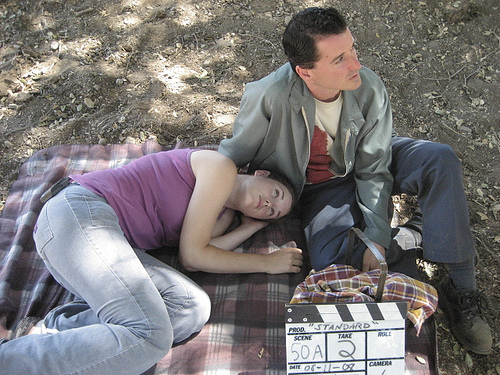
ABOVE AND
BELOW: Stills from the shooting of standard. Matthew
Magennis with actors Kellen Kaiser ("Harriet").
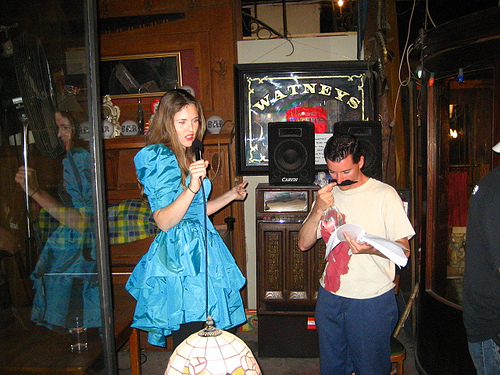
__________________
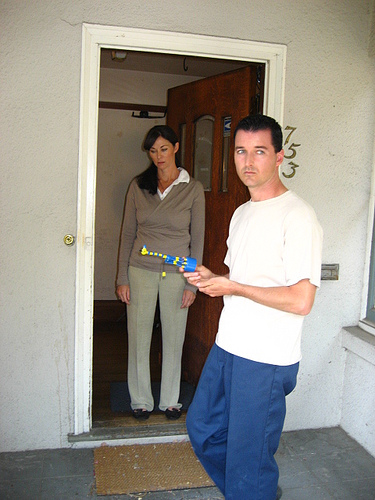
ABOVE AND
BELOW: Judy Blair portrays the forlorn "Olive",
the "stable" girl who Matthew Magennis' character "Nathan" leaves
behind when he goes off on his uncertain personal odyssey. Sound man
Blair Collins wires the doorway for the departure scene,
while director Jeff Palmer and D.P. John Tulin set up
the shot.
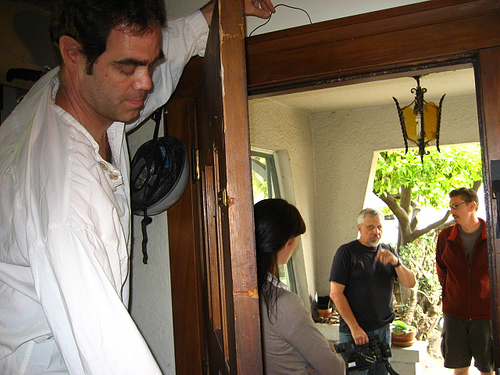
________________
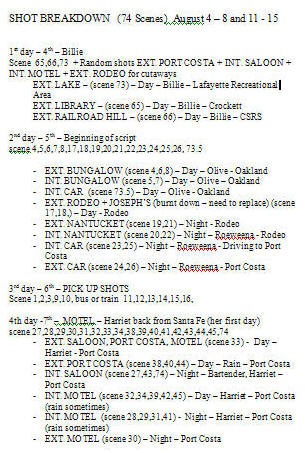
ABOVE:
Shooting schedule for the opening days of standard filming.
_________________________
FRINGE CHARACTERS

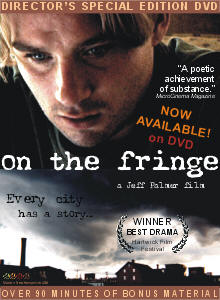 ON THE FRINGE:
Magennis, in his young career as a filmmaker, has shown a preference
for characters and outsiders, whether he is portraying
or writing for them. He portrayed "Seamus" in the critically
well-received indie film on the fringe, a still from which is
shown above. Magennis' character's transportation of choice was a
bicycle. The press packet for on the fringe defines the film
in a way that puts Magennis' career to date in sharp focus: ON THE FRINGE:
Magennis, in his young career as a filmmaker, has shown a preference
for characters and outsiders, whether he is portraying
or writing for them. He portrayed "Seamus" in the critically
well-received indie film on the fringe, a still from which is
shown above. Magennis' character's transportation of choice was a
bicycle. The press packet for on the fringe defines the film
in a way that puts Magennis' career to date in sharp focus:
"Set against the scenic backdrop of a vibrant New England fall... a
story of homecoming and healing unfolds when Kurt (Dan Clay) hits
the streets of Garrison Falls, New Hampshire. Traveling for nearly
three years after his mother's death, Kurt is back to reconcile with
his father Kenneth (Bill Humphreys) and brother Elijah (Jeff Fritz).
But his plans are quickly derailed when he befriends Dwayne (Jerry
Howe), a benevolent comrade of the town misfits. Over a game of
cards, Kurt meets Eddie (Michael Walsh), a deadbeat dad hiding from
gambling debts, and
Seamus (Matt Magennis), an antisocial pack rat
withdrawn from the world around him. Together, the four characters
form an uncompromising fellowship that pushes them into the fringes
of society. This is a stirring and complex vision wrapped in
breathtaking scenery." |


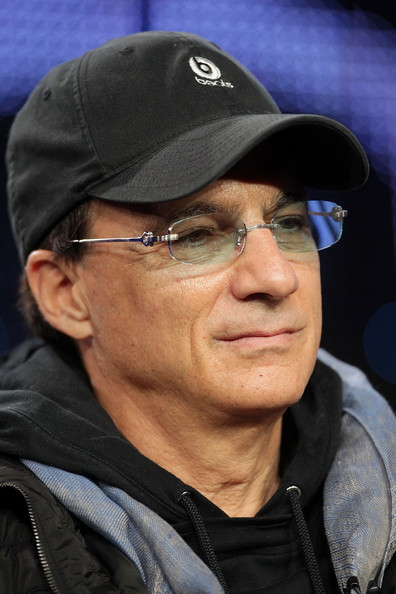 Learning
from Jimmy Iovine
Learning
from Jimmy Iovine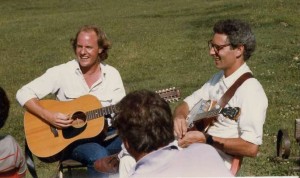
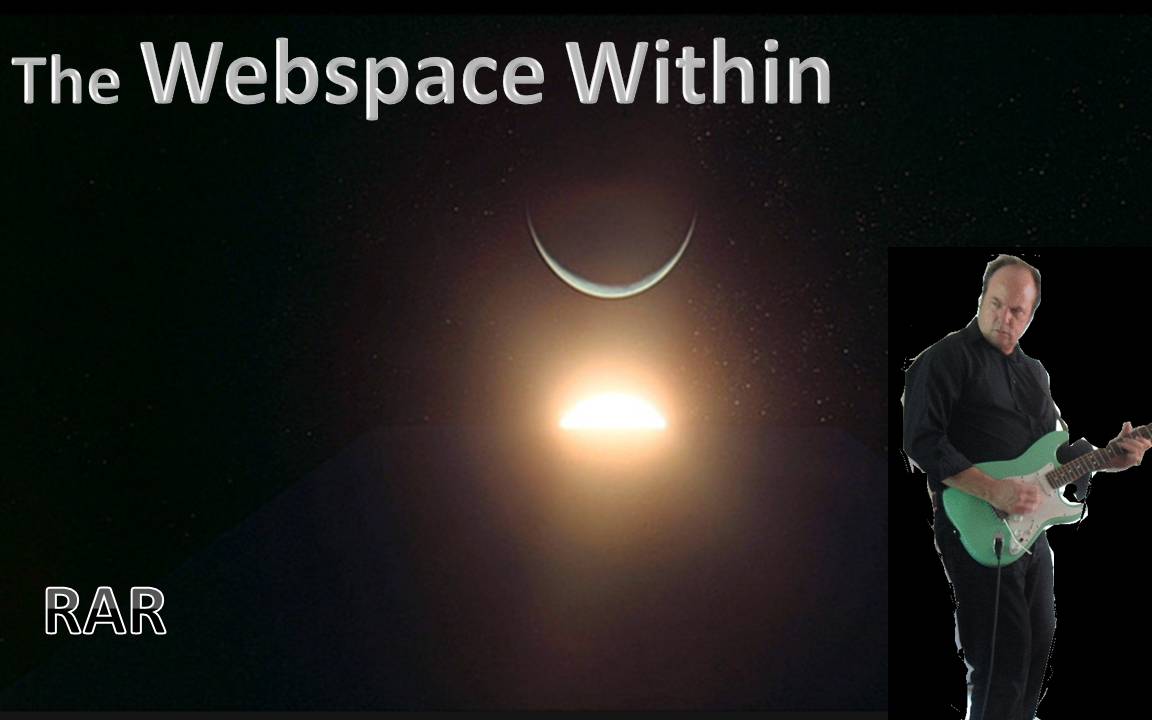
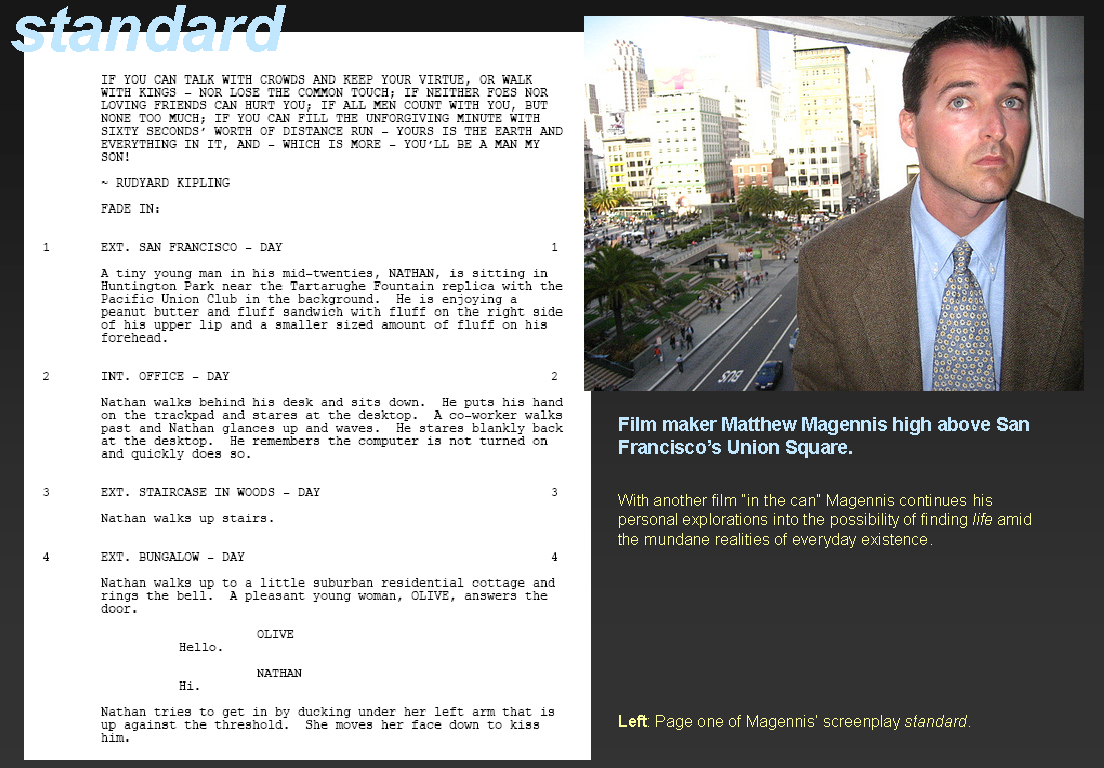






 ON THE FRINGE:
Magennis, in his young career as a filmmaker, has shown a preference
for characters and outsiders, whether he is portraying
or writing for them. He portrayed "Seamus" in the critically
well-received indie film on the fringe, a still from which is
shown above. Magennis' character's transportation of choice was a
bicycle. The press packet for on the fringe defines the film
in a way that puts Magennis' career to date in sharp focus:
ON THE FRINGE:
Magennis, in his young career as a filmmaker, has shown a preference
for characters and outsiders, whether he is portraying
or writing for them. He portrayed "Seamus" in the critically
well-received indie film on the fringe, a still from which is
shown above. Magennis' character's transportation of choice was a
bicycle. The press packet for on the fringe defines the film
in a way that puts Magennis' career to date in sharp focus:
